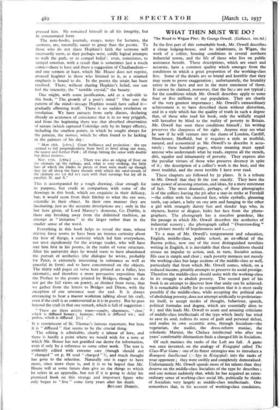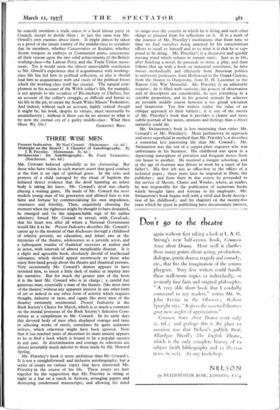WHAT THEN MUST WE DO ?
The Road to Wigan Pier. By George Orwell. (Gollancz. los. 6d.) IN the first part of this remarkable book, Mr. Orwell describes a cheap lodging-house, and its inhabitants, in Wigan, the work of a collier, housing conditions in several northern industrial towns, and the life of those who live on public assistance benefit. These descriptions, which are exact and accurate, have a common quality which emerges from the conditions in which a great proportion of the working-class live. Some of the details are so brutal and horrible that they may seem to prove exaggeration ; unfortunately, the brutality exists in the- facts and not in the mere statement of them. It cannot be claimed, moreover, • that the facts are not typical ; for the conditions which Mr. Orwell describes apply to some four or five millions of our population. They are clearly of the very greatest importance ; Mr. Orwell's extraordinary achievement is to have described them without distortion, and in a style which has the quality of truth in such a degree that, of those who read his book, only the wilfully stupid will hereafter be blind to the reality of poverty in Britain. Mr. Orwell has seen these conditions himself ; his writing preserves the sharpness of his sight. Anyone may see what he saw if he will venture into the slums of London, Cardiff, Manchester, Sheffield, but it requires a style as truthful, natural, and economical as Mr. Orwell's to describe it accu- rately ; these hundred pages, whose meaning must appal anyone who understands what he reads, express all the stench, dirt, squalor and inhumanity of poverty. They express also the peculiar virtues of those who preserve decency in spite of it ; the description of a collier's work is the best, and the most truthful, and the most terrible I have ever read.
These chapters are followed by 32 plates. It is a tribute to Mr. Orwell that they fit the text exactly. They have the same power of arousing emotion, and ideas, by a mere statement of fact. The most dramatic, perhaps, of these photographs is of the colliers leaving the pit after a stay-in strike at Fernhill the collier with his charcoal face, white eyeballs, gleaming teeth, cap aslant, a baby on one arm and hanging to the other a girl with strangely dainty feet and slender legs who, in shyness, horror or disgust, hides her face from the photo- graphers. The photograph has a macabre grandeur, like the passage in which Mr. Orwell describes the aesthetics of industrial scenery ; the photograph called " Overcrowding " is a picture merely of hopelessness and r..,,wry.
To a man of Mr. Orwell's temperament and education, English, middle-class, public school, an ex-official of the Burma police, now one of the most distinguished novelists writing in English, it is inevitable that these conditions should arouse an impulse to action, and, in turn, Socialist action. His case is simple and clear ; such poverty menaces not merely the working-class but large sections of the middle-class as well, particularly that from which Mr. Orwell comes, which, on a reduced income, pitiably attempts to preserve its social prestige. Therefore the middle-class should unite with the working-class in its struggle to abolish poverty. The second part of his book is an attempt to discover how that unity can be achieved. It is remarkable chiefly for its recognition that it is most easily possible if the middle-class, while accepting the political aim of abolishing poverty, does not attempt artificially to proletarian- ise itself, to accept modes of thought, behaviour, speech, political formulae and dogma, which are essentially alien to it ; and this leads Mr. Orwell to acute and amusing criticisms of middle-class intellectuals of the type which lately has tried to save its soul, redress its sense of guilt and personal defeat, and realise its own eccentric aims, through Socialism—the vegetarian, the nudist, the dress-reform maniac, the scholastic Marxist, the Chelsea intellectual who after ten years' comfortable dilettantism finds a changed life in Socialism.
Of such maniacs the ranks of the Left are full. A game was once invented, on the analogy of Kriegspiel called The Class-War Game : one of its finest strategies was to introduce a Bourgeois Intellectual (=Spy in Kriegspiel) into the ranks of your opponent ; they were swiftly and completely demoralised. Unfortunately Mr. Orwell spends more of his talents than they deserve on the middle-class Socialists of the type he describes ; and one notices suddenly that, while he has acquired an extra- ordinary sense of working-class social life, politically he thinks of Socialists very largely as middle-class intellectuals. One remembers that, in his account of working-class conditions,
he scarcely mentions a trade union or a local labour party or Council, except to deride them ; in just the same way Mr. Orsvell's 'own enemies abuse them. It might almost be taken as a proof of the innate enmity of the middle-class to socialism that its members, whether Conservative or Socialist, whether Storm troopers in embryo or Communist poets, concentrate all their venom upon the two solid achievements of the British working-class—the Labour Party and the Trade Union move- ment. Yet it would seem the almost unavoidable conclusion to Mr. Orwell's experience that if acquaintance with working- class life has led him to political reflection, so also it should lead him to acquaintance with and study of the political forces which the working-class itself has created. The natural com- plement to his account of the Welsh collier's life, for example, is not appeals to the socialists of Bloomsbury or Chelsea, but an account of the collier's struggle, as difficult and heroic as his life in the pit, to create the South Wales Miners' Federation. And indeed, without such an account, highly critical though it might be, his book, despite its virtues, must necessarily be unsatisfactory ; without it there can be no answer to what is by now the eternal cry of a guilty middle-class : What then















































 Previous page
Previous page